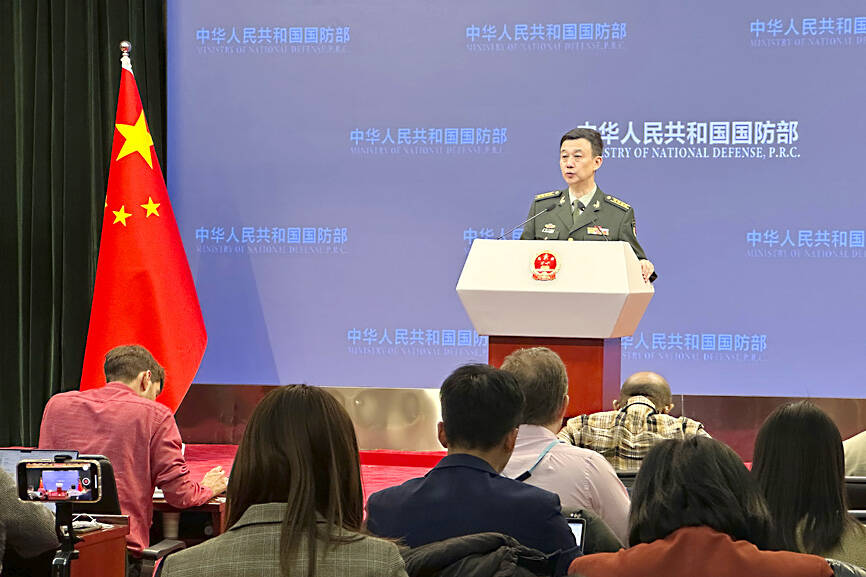China’s Ministry of National Defense on Thursday accused Taiwan’s government of deliberately “hyping up” a military threat from China for electoral gain ahead of elections in just over two weeks, but again sent warplanes into the Taiwan Strait.
As the Jan. 13 elections draw near, Taiwan has reported Chinese fighter jets and warships around the nation, as well as balloons crossing the median line of the Taiwan Strait, although the military says they are most likely for weather monitoring purposes.
Speaking at a monthly news conference in Beijing, ministry spokesperson Colonel Wu Qian (吳謙) said that Taiwan’s government was to blame for the tensions.

Photo: Emily Wang Fujiyama, AP
“The Democratic Progressive Party (DPP) authorities are deliberately hyping up the so-called ‘military threat from the mainland’ and exaggerating tensions,” Wu said.
“This is entirely to seek electoral gain,” he added, accusing Taiwan of using a “familiar electoral playbook to stoke confrontation and manipulate the election.”
Shortly after Wu spoke, the Ministry of National Defense (MND) in Taipei reported further Chinese military activities in the Strait, saying it had detected 12 military aircraft crossing the median line or flying close to it on Thursday afternoon.
It said the aircraft, including J-11 and Su-30 jets, entered airspace to the north, center and southwest of Taiwan, and “cooperated with communist ships to carry out joint combat readiness patrols.”
Wu reiterated that China did not recognize the median line.
“Taiwan is a part of China. The ‘median line’ absolutely does not exist,” he said.
The MND this week said it was not seeing any signs of large-scale Chinese military activity before the elections, but was keeping a close watch on China.
Wu said China’s People’s Liberation Army was well aware of Taiwan’s military movements.
“We will, as always, take all necessary measures to resolutely defend national sovereignty and territorial integrity,” he added.
From the start of this month, Taiwan has reported a spate of Chinese balloons drifting over the Taiwan Strait, saying they were probably monitoring weather conditions.
Wu declined to comment on the balloons.
China has also been angered by US arms sales to Taiwan.
“We firmly oppose any country having official and military contact with Taiwan in any form,” Wu added. “The US is manipulating the Taiwan question in various forms, which is a very dangerous gamble.”

The High Prosecutors’ Office yesterday withdrew an appeal against the acquittal of a former bank manager 22 years after his death, marking Taiwan’s first instance of prosecutors rendering posthumous justice to a wrongfully convicted defendant. Chu Ching-en (諸慶恩) — formerly a manager at the Taipei branch of BNP Paribas — was in 1999 accused by Weng Mao-chung (翁茂鍾), then-president of Chia Her Industrial Co, of forging a request for a fixed deposit of US$10 million by I-Hwa Industrial Co, a subsidiary of Chia Her, which was used as collateral. Chu was ruled not guilty in the first trial, but was found guilty

DEADLOCK: As the commission is unable to forum a quorum to review license renewal applications, the channel operators are not at fault and can air past their license date The National Communications Commission (NCC) yesterday said that the Public Television Service (PTS) and 36 other television and radio broadcasters could continue airing, despite the commission’s inability to meet a quorum to review their license renewal applications. The licenses of PTS and the other channels are set to expire between this month and June. The National Communications Commission Organization Act (國家通訊傳播委員會組織法) stipulates that the commission must meet the mandated quorum of four to hold a valid meeting. The seven-member commission currently has only three commissioners. “We have informed the channel operators of the progress we have made in reviewing their license renewal applications, and

Taiwan People’s Party (TPP) Chairman Huang Kuo-chang (黃國昌) yesterday appealed to the authorities to release former Taipei mayor Ko Wen-je (柯文哲) from pretrial detention amid conflicting reports about his health. The TPP at a news conference on Thursday said that Ko should be released to a hospital for treatment, adding that he has blood in his urine and had spells of pain and nausea followed by vomiting over the past three months. Hsieh Yen-yau (謝炎堯), a retired professor of internal medicine and Ko’s former teacher, said that Ko’s symptoms aligned with gallstones, kidney inflammation and potentially dangerous heart conditions. Ko, charged with

Taiwan-based publisher Li Yanhe (李延賀) has been sentenced to three years in prison, fined 50,000 yuan (US$6,890) in personal assets and deprived political rights for one year for “inciting secession” in China, China's Taiwan Affairs Office spokesman Chen Binhua (陳斌華) said today. The Shanghai First Intermediate People’s Court announced the verdict on Feb. 17, Chen said. The trial was conducted lawfully, and in an open and fair manner, he said, adding that the verdict has since come into legal effect. The defendant reportedly admitted guilt and would appeal within the statutory appeal period, he said, adding that the defendant and his family have